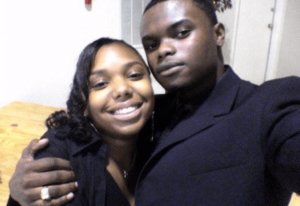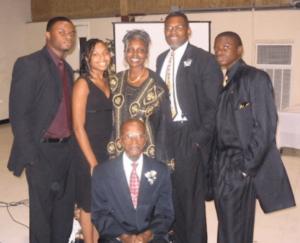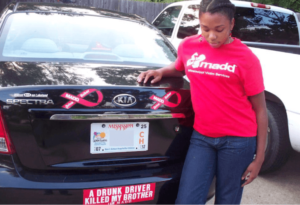By Prisca Patrick
I was supposed to die first. Not John Michael, my smart, gregarious older brother who was beloved by everybody.
I was 15 months old when doctors diagnosed me with Stage IV brain cancer. The largest tumor stuck to the back of my head the size of a golf ball; smaller ones had wrapped themselves around my spine. If I survived surgery, doctors told my parents—and that was unlikely—I would have an IQ no higher than 70. The prognosis was so grim my mom even picked out my funeral dress.
Miraculously, I proved them wrong.
Three years separated John Michael and me, and we grew up competing with each other in just about everything. Despite the rivalry, John Michael encouraged me when others might have accepted certain limitations in the girl who survived a brain tumor. At one point, I wanted to try out for cheerleading. He told me I could do it. He told me I could do anything, if I just tried it a certain way. He pushed me, even as he protected me.

We were so different. When I say everybody loved John Michael, that is not an exaggeration. In high school, he was the first African American to win the Beauty and Beau contest. He got along with everybody, no matter who they were. He was also very smart. He had scholarships to go to Howard University for free, but he decided to stay at home and go to our local community college.
The way I see it now, that decision gave our family more time with him.
On March 9, 2007, just three weeks after my 17th birthday, a repeat drunk driver ran a stoplight, killing John Patrick and his girlfriend, Rosalyn Coleman. He was 19. She was 18.
It happened so fast. That is what every drunk driving crash has in common. For the victims, it comes out of nowhere. It is sudden. It is violent. There is no time to prepare for it. It changes everything in an instant, forever.
Hours before John Michael was killed, he stood in our home asking me for the duffel bag I’d borrowed from him. He grabbed it and headed back out with his girlfriend, and we expected to see both of them later on. It was the Friday before Spring Break, and we all felt happy and excited. My mom, who was working on her RN degree at the same college as John Michael, had decided to cook a huge meal: fried chicken, macaroni and cheese, the whole works. My aunt and cousin came over, and I remember hearing them in the kitchen laughing and talking long after they’d eaten.

Later on, my mom took my younger brother to a lock-in at the church. She remembers passing a wreck on the way home, but she didn’t think much of it. At 11 p.m., we heard a loud knock on the door and heard the word, Police.
My mom went to get my dad. I ran into the kitchen, knowing something was wrong. You know what they say. When there’s a knock on the door or a call in the night, it’s never good. My parents opened the door. Two police officers stood there. One of them had my brother’s license.
“Is this your son?” he asked.
I remember seeing my mom collapse and watching my father, who was 6-foot-1, being consoled by two police officers as he lay on the floor. I couldn’t wrap my head around what was going on. That night, a 32-year-old man with three previous DUI charges, a suspended license, no insurance and a blood alcohol concentration of more than three times the legal limit ran a red light and killed my brother and his girlfriend instantly.
Instead of celebrating Spring Break, my grief-stricken parents planned a funeral for their 19-year-old son. My Sunday School class used the money they planned to spend during a trip to Memphis that week to pay for a dress I wore to my brother’s funeral. The following Thursday, we held John Michael’s wake. On Friday, we buried him. On Saturday, we went to Rosalyn’s funeral.
Despite being a repeat drunk driving offender and having a BAC over three times the legal limit, the man who killed my brother and his girlfriend tried to say that his brake shift went out on the night of the crash. At 17, I knew better than that. With a record like his, there was no way that’s what happened. The high BAC spoke for itself.
As painful as my brother’s death was—and always will be—our family did feel blessed in one way. We did not have to spend years going to court as the offender’s case wound its way through the criminal justice system. Nine months after the crash, the driver was sentenced to two 25-year terms to run consecutively, with five years suspended.
Every drunk driving crash impacts not just the person injured or killed but all those left behind. My younger brother, who looked so much like John Patrick that people often confused them, began passing out from stress fevers. These led to full-blown seizures. He just couldn’t take it. My brother, John Michael Patrick Jr., was my dad’s namesake. My dad dropped the “senior” from his name after his son died.
My brother and mom had been both set to graduate that May from the same college. My mom managed to finish out the semester. When she got her diploma, the school surprised her with my brother’s diploma as well. My mom became an advocate for Mothers Against Drunk Driving in Mississippi where we lived at the time and lobbied at the state capitol in Jackson for an ignition interlock law. She met with state senators and representatives in support of requiring all convicted drunk drivers to use these small, in-car breathalyzer devices, which require a sober breath sample before the vehicle will start.

When I got my first new car, my parents gave me a MADD bumper sticker, and when I moved to Dallas in 2016, I joined MADD North Texas. MADD helped me access free counseling services, which I realized I needed even though a decade had passed since John Michael’s death. It was rough. But it was great.
I’m thankful for MADD for giving me an avenue to share my story, to help others and help me heal. In Texas, I got more involved with youth and young adults, talking to school-age groups about drunk driving because I was a child when I experienced this tragedy.
Although I have learned to cope and things get easier, it doesn’t go away. It’s not one of those situations where I forget or stop feeling his absence, especially during milestone events, like my recent marriage.
And I know John Michael’s legacy lives on. For his senior yearbook, he chose this quote: “Everybody has a goal, but those who will succeed have a purpose.”
I live by this quote. If I can convince just one person not to drink and drive, then I have succeeded with purpose. One person at a time, it will happen. We will accomplish our purpose.



